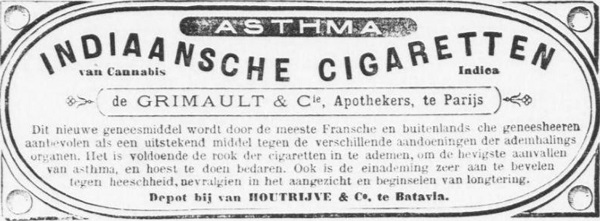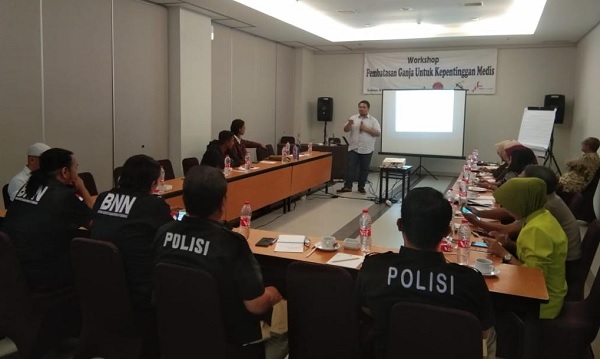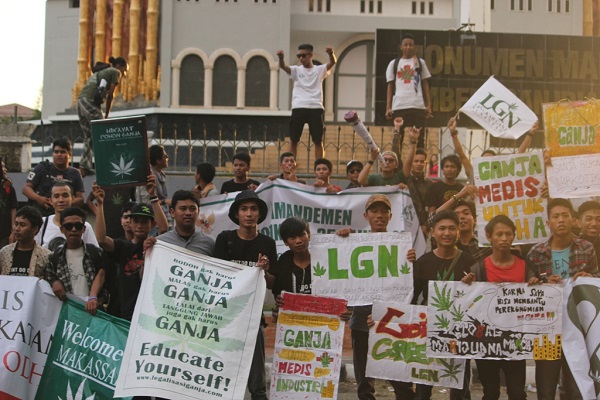The growing support for cannabis decriminalisation in Indonesia could both help and hinder broader drug reform
Dania Putri
In the late seventeenth century, GE Rumphius, a botanist working for the Dutch East India Company, included cannabis in his book, Herbarium Amboinense (1741), a catalogue filled with illustrations of plant species on the island of Ambon. The book shows that cannabis was widely used for recreational and medicinal purposes on the island. Its roots were used to treat gonorrhoea and its leaves to make tea for alleviating chest pain and asthma.
A century and a half later, WG Boorsma, head of the Pharmacological Laboratory of the Department of Agriculture, Industry and Trade in the Dutch East Indies, was tasked with investigating the patterns of cannabis use across the archipelago. He found that locals smoked cannabis along with tobacco leaves rolled in banana leaves, but found little evidence of problematic use. Others reported that cannabis had been found in Batavia (Jakarta), Buitenzorg (Bogor) and Ambon. It was even registered in the 1916 catalogue, The Useful Plants of the Dutch East Indies. But less than a decade later, in 1927, the Dutch colonial government criminalised cannabis following concerns related to cannabis use that were raised at the International Opium Conference in the Netherlands in 1925.
This colonial legacy of drug prohibition is preserved in current drug control policy. Yet punishing people for using drugs has not reduced drug demand as intended, but has instead led to additional harm as more people are forced into overcrowded prisons. Human rights violations against drug suspects are rampant and include torture, extra-judicial killings and discrimination. In the past five years, growing crackdowns on cannabis have driven demand for synthetic versions, causing a public health concern which was once again falsely understood as a justification for harsher policies.

The rise of cannabis activism
Meanwhile, the fight to change Indonesia’s harsh cannabis laws seems to be gaining ground. It started small, with its roots in digital activism on social media in about 2007. In less than a decade, online interactions transformed into offline rallies and community-organised events, most of which are affiliated with the leading cannabis advocacy group Lingkar Ganja Nusantara (the Archipelago’s Cannabis Circle, LGN). In 2015, the group obtained the first-ever licence to conduct scientific research on cannabis in Indonesia. The aim was to identify the substance’s potential for treating illnesses associated with diabetes, which affects nearly twenty million Indonesians.
LGN and its local grassroots affiliates focus almost exclusively on issues related to cannabis, which differs from other substances in terms of its recommended harm reduction approaches. Activists creatively use arguments related to economic progress, culture and environmental sustainability in justifying the need to legally regulate cannabis in Indonesia. The movement seems to have attracted an impressive and ever-growing group of followers on social media, including 100,000 on Facebook, and a quarter of a million on Instagram. These social media outlets provide a lively meeting place for enthusiastic and engaged activists.
LGN is mostly run by volunteers whose work is wide-ranging. It includes creating educational content and events, conducting research, meeting with cannabis patients, talking to the media and government officials, merchandising and managing donations. These rather fluid roles help expand and shape the direction of LGN as a movement. Currently, it is transforming to promote law reform not only based on the therapeutic, spiritual and traditional aspects of cannabis, but also based on human rights in general.
Without external funding, LGN’s work – and the cannabis movement’s work in general – may appear less strategically sound than that of organisations involved in the harm reduction and drug policy reform movement. LGN’s lack of funding has made it difficult for them to make real use of their cannabis research licence. Like many other organisations, they have been hamstrung by Indonesia’s complicated bureaucracy despite the licence. Yet, perhaps it is this very lack of institutional support that has allowed the cannabis movement to blossom quickly and organically. In addition to a growing and diverse management team, LGN is now regionally represented in 25 Indonesian cities.
Cannabis exceptionalism
Cannabis activists dedicate large amounts of their time and energy to the cause, concentrating on the future of cannabis regulation and its promising impact on the health of Indonesians and their economy. But by focusing on cannabis exclusively, activists run the risk of indulging in cannabis exceptionalism, which is when the fight for cannabis legalisation trumps other and sometimes more important struggles. It encourages the idea that cannabis should be made legally available because it is benign whereas other drugs are so dangerous they should be kept illegal. This approach has demonised the general use of psychoactive substances like MDMA, a substance that heightens empathy and sociability, among other therapeutic benefits.
Activists point to the medical benefits of cannabis and champion it over other drugs for the sake of proving that the prohibitionist system is broken. However, studies on drug policies in Indonesia, Myanmar and elsewhere show that criminalisation and harsh punishment tend to foster high-risk drug use practices by pushing already marginalised individuals further away from health and social services, making deaths and other health problems more likely.
Cannabis legalisation should only be a small part of wider efforts to reform drug-related and public health policies. Failing to consider the larger picture means perpetuating myths and double standards regarding drug use, including non-medical or recreational cannabis use. This resembles tactics used by those who condemn the use of prohibited drugs – like cannabis, heroin or MDMA – but condone or even promote legally regulated drugs manufactured by international pharmaceutical companies and commercially marketed drugs such as tobacco.
Nonetheless, isolating the cannabis issue from other potentially more complex drug-related matters has a certain logic to it. Advocates frame cannabis legalisation in the context of tradition, spirituality, religion and environmentalism – matters which interest a much larger audience. Such framing has the potential to engage people unfamiliar with drug policy concepts such as ‘harm reduction’ or ‘crop substitution’. The relatively low level of problematic cannabis use in Indonesia also makes it easier for advocates to speak of ideas that appear revolutionary, sometimes even touching on patriotism and sovereignty. In Indonesia, where strong anti-drug sentiments prevail, this may open the space for cannabis advocates to engage in public discussions and gather support for alternative policies like decriminalisation.
Tough questions
Legalising cannabis use would require Indonesian lawmakers to answer some tough questions. If cannabis were to be made legally available for medical purposes, should it be accessible to everyone who claims to need it, or only for those who are deemed sick enough by a few licensed medical practitioners? What to do then with the tens of thousands of cannabis users serving prison sentences? Should they be released?

Putting an end to cannabis arrests, which make up a good portion of all drug related arrests, will free up resources to focus on health and harm reduction services that desperately need improvement in Indonesia, especially in prisons. Limiting punishment in this way would contribute to safer environments in which cannabis use takes place. Prohibition is only one alternative, and we know that it doesn’t work.
By contrast, decriminalisation promises to enhance the wellbeing of Indonesians, regardless of which or whether drugs are involved. Decriminalising drug use and small-scale possession in all its forms is too radical (for now). There is certainly more work to be done in popularising the idea of decriminalisation and making it more compelling to the public. Cannabis, with its long history in Indonesia, might be the key to getting that job done more quickly.
Dania Putri (dania@persep.si) is an independent drug policy researcher, currently working with the Transnational Institute.
